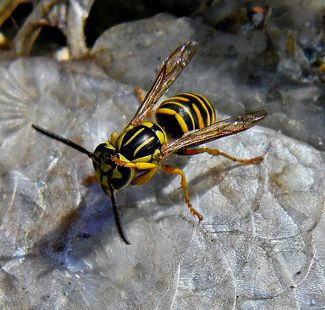Yellow jackets are out in force!
By Chris Williams on August 19, 2015.
 This summer seems to be shaping up as a banner year for yellow jackets in the New England. Since early July, the calls I’ve been receiving in my schedule have been non-stop and often with multiple wasp colonies at each account. Nests in the ground, aerial nests on eaves or up under decking have been the primary locals, but now those colonies nesting in wall voids are starting to be noticed as well. Not really sure why they are so abundant this year, but they are really doing well! I have a big baldfaced hornet nest in one of the shrubs in my yard that I barely avoided getting attacked by while mowing a couple of weeks ago. Seems they didn’t appreciate my jostling the branches of the shrub while I was mowing around it!
This summer seems to be shaping up as a banner year for yellow jackets in the New England. Since early July, the calls I’ve been receiving in my schedule have been non-stop and often with multiple wasp colonies at each account. Nests in the ground, aerial nests on eaves or up under decking have been the primary locals, but now those colonies nesting in wall voids are starting to be noticed as well. Not really sure why they are so abundant this year, but they are really doing well! I have a big baldfaced hornet nest in one of the shrubs in my yard that I barely avoided getting attacked by while mowing a couple of weeks ago. Seems they didn’t appreciate my jostling the branches of the shrub while I was mowing around it!
This is unfortunately the most common time of year for the homeowner or really any outdoor enthusiast to encounter yellow jackets as the colonies are reaching their peak population numbers during late August, and into September. Many express surprise at the size of these nests that just ‘showed up’ overnight. The reality is that these colonies arise from a single fertile queen that has emerged from winter hibernation in late April/May to begin establishing her colony. We’ve all seen those brand new golf ball sized (or smaller) nests attached to a garage doorframe or soffit. They’re a pretty easy target at that point of the season in mid May, but if she happens to locate underneath a deck or in a thick shrub, there is a pretty good chance that the colony won’t be noticed at all until a mid summer event takes place on the deck or gardening activities like mowing or hedge trimming get too close stirring them to go on offense.
Be on the alert now for yellow jackets around your home or in your yard. They are dangerous wasps, especially for sensitive individuals. Call the professionals at Colonial Pest Control for effective yellow jacket control!
By Bob Peterson from North Palm Beach, Florida, Planet Earth! [CC BY-SA 2.0], via Wikimedia Commons
Stay up-to-date with Colonial Pest’s email newsletter!